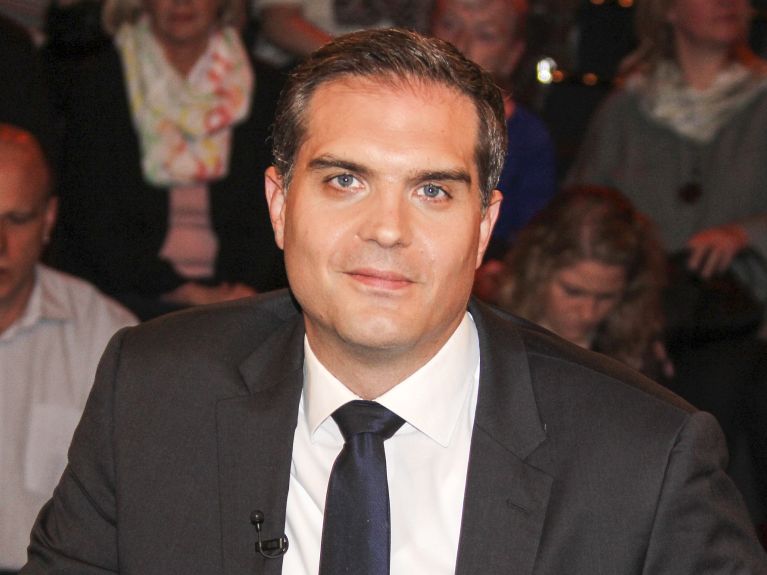“Germany is highly respected”
Frederik Pleitgen, reporter for US broadcaster CNN, talks about how Americans perceive Germany and why he struggles with fake news.

Mr. Pleitgen, you, as a German journalist, have been a reporter at CNN for ten years. Why do you work for American television?
I’ve always had an interest in American broadcasters. I lived in the USA for a time with my parents and also studied there, at New York University. In 2005, I helped out at CNN in Atlanta in the context of the Arthur F. Burns Fellowship, a German-American scholarship. That was precisely the time that Hurricane Katrina laid waste to the city of New Orleans. I got in my car and drove there alone, to report for the German broadcaster I was working for at the time, n-tv. I guess that impressed the staff at CNN; in any case a year and a half later they hired me.
Germans plan long term, whereas Americans make many snap decisions.
How do German and American media differ?
I believe the greatest difference lies in the fact that Germans plan long term, whereas Americans make many snap decisions. That has its advantages in situations where things change quickly. And when certain events become big topics, Americans wade in with a great deal of resources. When the Paris attacks happened, for example, we got many staff there on the ground extremely quickly. Another difference is that responsibility is given to younger journalists early on. During the Iraq war we had some reporters there who were in their late 20s, early 30s – and some of them were in senior positions.
Dieses YouTube-Video kann in einem neuen Tab abgespielt werden
YouTube öffnenThird party content
We use YouTube to embed content that may collect data about your activity. Please review the details and accept the service to see this content.
Open consent formThe impression often arises that the tone of reporting is different in the USA, and that includes the resputable media. Does news have to be “sold” differently compared to in Germany?
I believe the tone is more personal; Americans don’t have formal and informal forms of address for a start. In addition, the live element plays a larger role in American television and viewers therefore see the reporters bringing them the news more often. It is also a cultural tradition – German programmes tend to be somewhat formal, American ones more casual. Reporting must of course be reliable and mustn’t degenerate just because you want to be more casual. You need to strike the right balance.
Anyone who questions the free press attacks the stability of society as a whole.
Precisely in the USA people are talking a great deal about manipulated or so-called fake news. Does this topic concern you?
Very much so. Politicians bandy the term about, which I think is pretty dangerous, because the free press is a fundamental institution of the democratic state. Anyone who questions it indirectly attacks the stability of society as a whole. The media must defend themselves, go on the offensive against such accusations and rebut them. At the same time we must be strong in our research – mistakes are immediately decried as fake news. So, make as few mistakes as possible, but should they happen, respond accordingly: admit the error and correct it.
Are you personally affected by fake news accusations?
Unfortunately yes, particularly on social media. When I reported for CNN from Iran, for example, people claimed I wasn’t there at all and that my pictures weren’t real. Some of the attacks are very crude and way below the belt. For that reason I try to keep a low profile on social media and not let unproductive Twitter dialogues sap my energy.
You received the Hanns Joachim Friedrichs Award for outstanding journalistic achievement in 2017. The award is named for the renowned German journalist and long-time news anchor on German television who died in 1995. What does the award mean to you?
Hanns Joachim Friedrichs called for journalists never to be biased towards anything, even good things. I think that is very important today. The atmosphere is very tense, and all sides are trying to sway journalists. I report a great deal on controversial topics from Syria, Iran and Russia. Even academics or people who purport to take a scholarly approach in their work want to get you on their side. A journalist simply mustn’t do that. There are so many examples of things turning out to be different from what you initially thought. The only thing that helps is to remain objective, even if it’s not easy.
Another reason you won the award is because, according to the laudation, you “raise awareness of German realities in the USA”. How well can that succeed given a president who certainly does not shy away from criticizing Germany on Twitter?
Germany is highly respected. Many Americans look at us with envy and believe the country does a lot right. They long for less drama in government and a longer decision-making process. This view of Germany may be somewhat glorified, but in general serious political discourse enjoys a high standing.
You are currently based in London. How do you perceive the mood there in view of Brexit?
People who voted for Brexit are often somewhat defiant and are sticking to their guns, even though it is causing the country problems economically. But there are also Brits who wish they’d voted differently. Many people are only now realizing that there was no plan for how to manage the exit from the European Union and what will happen after. On top of which, the government in Westminster sought to strengthen ties to the USA parallel to Brexit, but in the UK Donald Trump is a controversial figure.
Would you like to return to Germany one day?
I can certainly imagine working in Germany again. But at the moment working for CNN is very exciting and I’d like to continue there for a while. Every year I try to do something I have never done before in my life. In 2017, I did a major report on the U.S. Air Force and for the first time witnessed the aerial warfare the Americans conducted in the Middle East. Leaving my comfort zone, risking something new, perhaps even something I’m afraid of: I’ve always managed that in the last ten years.
Interview: Christine Mattauch

